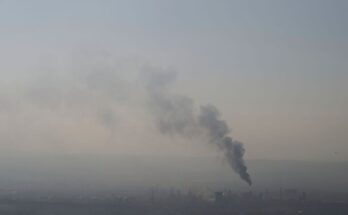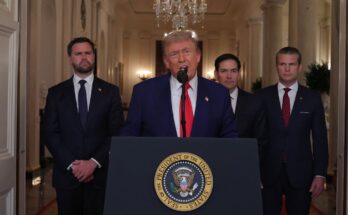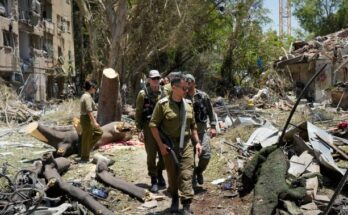
LONDON, Jun 23 (IPS) – A deal between the US and Iran is possible if Iran’s bottom line — its right to nuclear enrichment — and Israel’s bottom line, guarantees that Iran will never have a nuclear bomb are met. This “win-win” outcome would require Donald Trump’s personal engagement. With weapons turned to plowshares, Trump would be considered for the Nobel Peace Prize.
For sure, it’s hard to imagine a path forward in current circumstances. The region is embroiled in conflict. Iran has been humiliated by Israel’s attack. Its nuclear program has been seriously damaged. Israeli air power has destroyed air defenses, incapacitated Iran’s missiles, and killed its military leaders and scientists.
Israel’s actions in the past year have changed the balance of power, neutralizing Hezbollah, Hamas and eliminating the Pro-Iranian Assad regime in Syria.
Javad Zarif, Iran’s former foreign minister and nuclear negotiator, often spoke to me about “Persian pride.” To move forward, a peace deal would have to address Iran’s battered psyche and Israel’s sense of vulnerability.
I envision a deal that would allow Iran to maintain its enrichment facility deep underground at Fordo. The International Atomic Energy Agency would need unfettered access to Fordo ensuring that enrichment was capped at 7 percent, well below the level needed for a nuclear bomb.
Iran’s nuclear program has been set-back as a result of Israeli strikes. Natanz and other enrichment facilities have been damaged and would be permanently dismantled. The Isfahan nuclear complex, which includes a uranium-conversion facility turning “yellowcake” into uranium hexafluoride, has been disabled by Israel’s air strikes and would be decommissioned.
The Tehran Research Center, which manufactures advanced rotors for enrichment, is destroyed. So is the workshop at Karaj, where other uranium enrichment components were manufactured.
Missile and drone attacks are another concern. The US would give security guarantees guarding against such attacks. It would commit to providing Israel with additional Thermal High Altitude Area Defense (THAAD) battery systems, an effective mobile surface to air interceptor that shoots down incoming ballistic missiles at a distance of 1,800 miles. Iran’s missile system has been degraded but it is not destroyed.
For the foreseeable future, the US would deploy an aircraft carrier group in the Arabian Sea. Each carrier has more than 60 war planes that can deter missiles and drones strikes. Fighter jets already deployed in the region would also be available for Israel’s defense.
Netanyahu wants Trump to use the Massive Ordnance Penetrator (MOP), a “bunker buster”, to take out the Fordo facility. Ford is buried deep underground in a mountain side. Only the US has bunker busters to disable Fordo’s enrichment process.
A bunker buster is designed to penetrate hardened targets using precision-guided 30,000-pound bombs armed with a 5,300-pound warhead. More than one bomb will be needed to disable Fordo. The mission’s success is uncertain. Fordo adjoins a base of the Iranian Revolutionary Guard (IRGC). Its air force could take down the B2 planes needed to deliver bunker buster ordinance.
Trump is under pressure from Netanyahu to attack Fordo. So far, Trump is keeping his options open. Trump insists on Iran’s “complete surrender”. The Ayatollah says Iran will never “grovel” to Washington. It is unlikely that Iran will waive a white flag. Resistance and martyrdom are at the core of Shiite beliefs.
Iran has signaled it is ready to meet US negotiators and discuss a ceasefire. An agreement would commit the US to never use bunker busters unless Iran weaponized its nuclear program.
Iran’s belligerent posture may change when the Iranian people take stock of the regime’s mismanagement. The Iranian people are fed up with their pariah status. Trump’s decision not to intervene would increase the prospects of Iran’s home-grow democratic transition, the best guarantor of peace.
The deal could reap economic and diplomatic benefits. An agreement could catalyze reform across the region, including progress in Gaza. A ceasefire leading to an independent Palestinian state could result in Saudi Arabia’s decision to join the Abraham Accords and normalization of relations with Israel.
Is this positive vision possible? If we can imagine it, we can make it a reality.
Peacebuilding would start with a deal to fully, finally and verifiably eliminate the possibility that Iran’s nuclear program would be used for anything but peaceful purposes.
Current events in the Middle East are nothing short of disastrous. They can, however, be a catalyst for transformation. Only the US can lead this process, and only Trump has the chutzpah to try it.
IPS UN Bureau
Follow @IPSNewsUNBureau
Follow IPS News UN Bureau on Instagram
© Inter Press Service (2025) — All Rights Reserved. Original source: Inter Press Service



